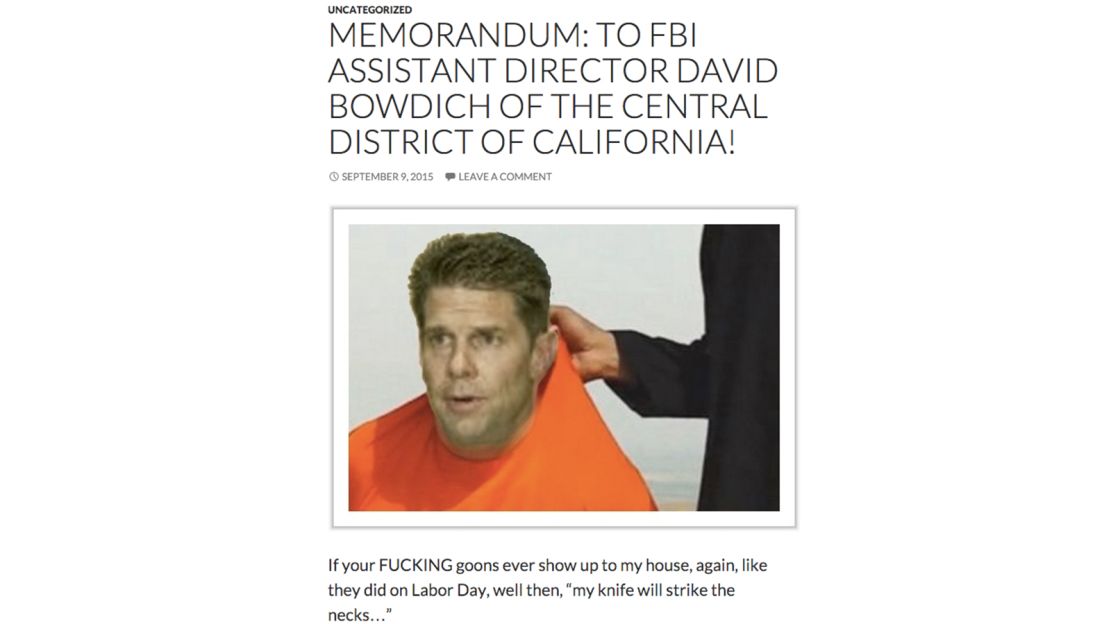Story highlights
The federal government wants Peter Ronald Wexler behind bars for what he's written
His lawyers say the Constitution should protect him
Hunched over the keyboard of his computer in a mobile home park a few miles from Disneyland, Peter Ronald Wexler allegedly blogged in support of cop killers and the terror group ISIS, according to authorities.
He even “encouraged others to ‘level’ the Turkish Consulate in LA with a Ryder truck,” they said.
Following an anonymous tip about his provocative online posts, an FBI supervisor in Los Angeles weighed in on the material.
“Everything we have reviewed to date falls into the category of First Amendment protected speech,” Special Agent Voviette D. Morgan wrote in an email dated September 7, 2015.
That would all change a day later when agents showed up at Wexler’s RV to conduct a threat assessment.
Wexler, 50, politely turned agents away at the door.
Then he turned to his keyboard:
“Is it murder to kill an FBI Pig who knocks on your door without a warrant?” Wexler allegedly wrote in a blog post. “I think not.”

A day later he posted “a personal MEMO to David Bowdich,” the FBI’s top agent in Southern California.
“If your [expletive] goons ever show up at my house again,” the post read, “my knife will strike the necks.”
Wexler has since been charged in a 20-count federal indictment with making criminal threats to harm or kill Bowdich and other agents, including by “cutting their throats and beheading them.” He has pleaded not guilty.
His trial, which quietly got underway last week in U.S. District Court in Santa Ana, promises to test the limits of what constitutes free speech. The case is expected to go to the jury Wednesday morning.
Following Wexler’s arrest, Bowdich went on to become the public face of the FBI in the wake of the San Bernardino terrorist attacks. He has since been promoted to a top job at FBI headquarters in Washington, D.C.

Bowdich testified last week that he was told about Wexler’s blog posts when he headed up the Los Angeles field office and that he took them seriously. He said he was concerned about his family’s safety.
In order to win a conviction against Wexler, prosecutors must convince jurors that Wexler’s comments were “a serious expression of an intent to physically harm or murder” Bowdich and other agents and that “a reasonable person” would interpret them that way as well.
Wexler’s defense attorneys contend that their client is a non-violent satirical blogger whose postings are “core political speech” protected under the First Amendment. The posts about Bowdich and the FBI are taken from among hundreds of entries dealing with topics such as US foreign policy in the Middle East, presidential politics and policing in America and contained strong languages and images throughout.
“If you look at the whole blog, it’s obvious this is political satire,” defense attorney Caleb Mason said in a recent interview with CNN.
“The government has made not one single allegation that Mr. Wexler has ever done a violent thing in his life,” co-counsel Marri Derby wrote in court filing.
Mason is a former federal prosecutor who in 2009 won a conviction against a man charged with making threats against then-presidential candidate Barack Obama, only to have the conviction overturned on the basis that his supposedly threatening words were in fact protected free speech.
“This case is no different,” he said.
Mason, now in private practice, said he joined Wexler’s defense on a pro-bono basis as a matter of principle.
Defending Wexler, Mason said in an interview, “is like the ACLU defending the Nazis in Skokie.”
Prosecutors have portrayed Wexler as a serious threat not only to Bowdich, but to those investigating him as well. They sought and received special permission to conduct a pre-dawn SWAT raid to arrest him, despite a peaceful encounter weeks earlier, and persuaded a federal judge he posed a continuing danger to the public and should be held without bail prior to trial.
The case is being handled by anti-terrorism prosecutors and is being closely watched by supervisors in the Los Angeles US Attorney’s office.
Mason and Derby paint a picture of a socially awkward, unemployed systems administrator who takes out his frustration on the keyboard. The defense attorneys hinted at psychiatric problems earlier in the case but ultimately did not proceed with a “diminished capacity” defense.
Wexler created his blog in 2006 and seems to have blogged in relative obscurity for years. He testified that he relied on sarcasm and hyperbole to get his points across and intended to be provocative. But he said none of his posts were intended to convey threats to Bowdich or other agents.
He came to the attention of the FBI following a series of allegedly threatening emails and posts in the summer and fall of 2015.
In July, he wrote that various officials and institutions in Texas ought to be “lit up” in retribution for the death of Sandra Bland, an African-American woman who hanged herself following a minor traffic stop and subsequent arrest.
A month later, he posted a message on the Jacksonville, Florida airport’s Facebook page saying the Jacksonville Aviation Authority “needs to be blown out of existence.” The message included the Arabic phrase, “Allahu Akbar,” meaning “God is great.”
Later that month, he emailed staff members at Leavenworth federal prison in Kansas complaining about the treatment of Chelsea Manning, formerly known as Bradley Manning, an American soldier convicted of espionage. He wrote that Manning’s treatment “requires revenge” and directed “ISIS Throat Slitters” to a beach near Camp Pendleton frequented by Marines and their families.
“It is the perfect place to go and slit many throats,” Wexler wrote.
On September 6, the FBI received the anonymous tip that prompted agent’s Morgan’s review of his blog and the visit to his home.
All of the counts charged in the indictment stem from a tirade of posts made in the wake of that visit.
He told agents on his blog not to bother him again “unless you’re looking for a Left-Handed Shave with my kitchen knife, a Schrade SCHF9, whch can chop down a tree and perfectly slice a juicy red, vine-ripened tomato, in that order!”
[The left-handed reference apparently applies to “Jihadi John,” an ISIS executioner who appears in several Internet beheading videos.]
Wexler singled out Bowdich who, he wrote, should be “shot in the back!”
“That [expletive] just got under my skin, and my trigger finger is suddenly getting very itchy.”
The postings included a photo of Bowdich’s head placed in the crosshairs of a rifle scope and superimposed onto the bodies of ISIS beheading victims.
Two and a half weeks after their initial visit to Wexler’s RV, agents armed with a search warrant descended on the location before dawn. Members of the bureau’s SWAT team deployed a “flash bang grenade” as diversion and attempted to pry open the RV’s windshield.
A sleeping Wexler was arrested without incident.
During the September 25 raid, they discovered the same knife mentioned in his post and found Google searches to determine the precise location where Bowdich worked, prosecutors allege.
They’ve introduced the knife, found along with other cooking implements in a drawer near the RV’s kitchen, as evidence at trial in an attempt to show that Wexler had the means to carry out the attack.
But an email from one FBI case agent to another turned over to defense attorneys suggests that agent was not taking the threat as seriously as prosecutors.
The message from agent Mark R. Espiritu was an apparent reference to Wexler’s post about his kinfe’s ability to slice through vine-ripened tomatoes.
“Hey bro,” the September 8 email read, “it’d be funny if we showed up with tomatoes for our next visit. Or even just left one on his door step.”
Prosecutors dismissed the exchange as a joke intended to diffuse tension in a stressful situation.
Obtaining a conviction in what’s known as a “pure speech” case can be difficult.
Mason, the former prosecutor now representing Wexler, thought he had done so in the case of the United States v. Bagdasarian.
Walter Bagdasarian referred to then-Sen. Obama with racial slurs in online posts during the 2008 presidential campaign and wrote that “he will have a .50 cal in the head soon.”
Secret Service agents searched Bagdasarian’s house and found guns, including a .50 caliber rifle.
He was convicted of criminal threats against Obama and sentenced to time served.
Two years later, the Ninth Circuit Court of Appeals overturned his conviction. The court ruled that Bagdasarian’s statement was not a “true threat” to Obama and that his speech – however unpleasant – was protected by the first amendment.
Mason, who was part of team of prosecutor in the U.S. attorney’s office in San Diego, said he believed Bagdasarian was guilty at the time.
But he said the court’s reversal created new case law that would bar him from prosecuting the case today.
Mason did not seek to defend Wexler’s views, only his constitutional right to express them.
“Is all of this nasty, offensive? Yes, for sure,” he told jurors during closing arguments. “But it is not a crime.”
Assistant US Attorney Melissa Mills told the jury the limits of Wexler’s free speech ended with Bowdich’s and the other agents’ rights to feel safe.
“Threats are not protected by the Constitution,” she said.

